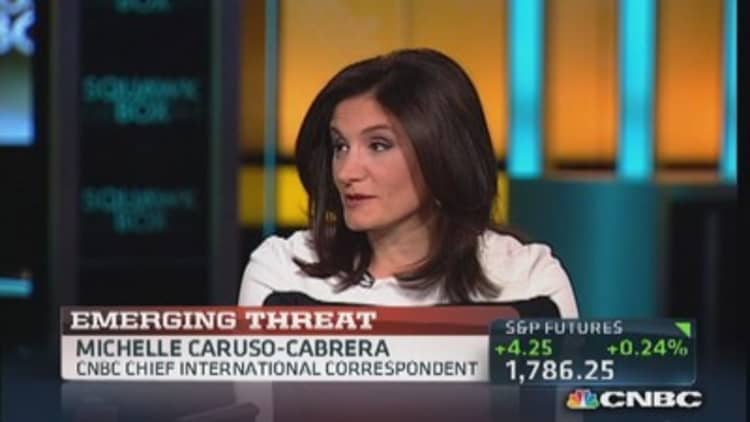Talk of a Chinese shadow banking crisis is on the rise, leaving many investors in the U.S. and elsewhere wondering: What exactly does that mean?
Shadow banking is unregulated, high-yield lending that largely takes place off banks' balance sheets. China's central bank wants to restrain risks related shadow banking in that country, but has shown little interest in shutting it down entirely.
Fears about China's banking system have flared recently because of a financial product known as a wealth management product, or WMP, that was widely expected to default this week until an 11th-hour agreement resolved the situation. This particular WMP has a three-year maturity and was supposed to bring a return of between 9.5 percent and 11 percent—far above the 3 percent deposit rate banks are paying. The initial principal investment was roughly $500 million.

WMPs are pervasive in China, and many are seen as being at risk of going bust. They are often invested in risky assets such as pawn shops, or in infrastructure projects that have no revenue. And sometimes they aren't invested but are just rollovers of WMPs that have matured.
(Read more: Are China shadow banking woes exaggerated?)
It's feared that investors will abandon WMPs, which despite their risk provide credit to small and midsize businesses. That would lead to tighter credit and an economic slowdown. It could also lead to a run on the banks if investors fear they're too exposed.
Some China experts are less concerned, for two reasons.
First, the nation has a lot of money to recapitalize any bank it wants to. Second, it has a "closed capital account." That means money does not flow freely across its borders but moves only if the Chinese government says it can move. The implication is that the government can shut down, or almost wall off, the banking system. It's debatable whether that's a good thing, but in the short term, it means that China can control or stop money from leaving the country or even leaving the banks.
(Read more: )
WMPs are widely believed in China to be guaranteed by the government, but it's not clear if that's true. That leads to a different fear of many market watchers: If the Chinese government bails out investors in a WMP, it could make the risks associated with them much higher and avoid short-term problems in exchange for much bigger ones down the road.
—By CNBC's Michelle Caruso-Cabrera. Follow her on Twitter: @MCaruso_Cabrera


